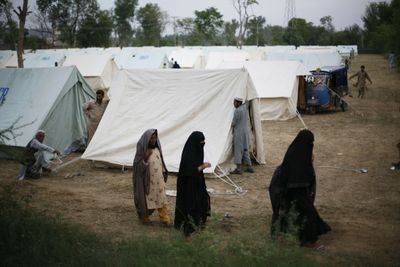Pakistan declares war on Taliban militants

ISLAMABAD, Pakistan – Pakistan declared war on its homegrown Islamic extremists Thursday in a dramatic move that could trigger a wider conflagration.
Prime Minister Yousuf Raza Gilani, in a late-night televised address to the nation, said Pakistan would launch a full-scale offensive against Pakistani Taliban guerrillas who’ve seized control of the vast Swat Valley, which is about 100 miles north of the capital.
Pakistan will no longer “bow our heads before the terrorists,” Gilani said in an 11 p.m. address as he called on citizens to rally behind the armed forces. He said that the government had tried peaceful negotiation with Taliban entrenched in the Swat Valley, but the strategy hadn’t worked.
Pakistan had “reached a stage where the government believes that decisive steps have to be taken,” he said, and the army’s job now was to “eliminate the militants and the terrorists.”
Thousands of civilians have fled from Swat and neighboring districts in the fighting between the army and militants in the past week, but hundreds of thousands are unable to move and could be caught in the crossfire. Gilani appealed to the international community for humanitarian aid.
Islamabad acted under intense American pressure and after Secretary of State Hillary Clinton warned last month that the situation in Pakistan “poses a mortal threat to the security and safety of our country and the world.”
The Taliban, which seized control of Swat in northern Pakistan early this week, are linked to al-Qaida and other extremist networks in the ungoverned tribal areas along the Afghan border, as well as to cells in Islamabad and across Pakistan. A spinoff of the Afghan Taliban, the Pakistani militants are even more extreme and ideologically committed.
In taking on the homegrown Taliban, nuclear-armed Pakistan risks devastating retaliatory terrorist strikes in its cities. Extremists are sure to accuse the pro-Western government of buckling under U.S. pressure. The move conceivably could also trigger terrorist assaults in the West – which would probably require cooperation from al-Qaida, as the Pakistani Taliban have no known strike capacity overseas.
The Obama administration, which had been criticizing Pakistani President Asif Ali Zardari before his arrival in Washington this week, welcomed the move.
“We have seen, in the last week or two, significant Pakistani military action against … the Taliban in Buner District and in clear recognition that the agreement in Swat has failed,” Defense Secretary Robert Gates told reporters in Kabul.